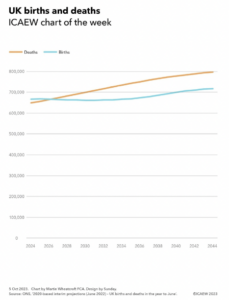
According to the ICAEW, deaths in the UK are expected to exceed births within just a couple of years, which will be a major change in the UK’s demographic story.
The primary factors influencing population growth in the UK—and many other developed countries—have been a declining birth rate and a significant increase in life expectancy. This trend has traditionally contributed to a growing population, even without considering net inward migration.
However, this growth is beginning to decelerate as the birth rate, relative to the total population, continues to decline. In the absence of migration, the UK is on course for a demographic shift, with the death rate expected to surpass the birth rate. This reversal is largely driven by the “baby boomer” generation, a sizable demographic cohort, reaching their 60s and 70s, leading to a higher mortality rate.
Projections suggest that in the year to June 2026, births will be 667,000, while deaths will reach 665,000, leading to a minor net increase of just 2,000. But after that, the gap widens, with deaths expected to exceed births by 80,000 in the year to June 2044.
Despite this shift from “natural” population growth (births exceeding deaths) to “natural” population contraction (deaths exceeding births), the UK’s population is still expected to grow. This is due to the Office for National Statistics’ assumption of consistent net inward migration, averaging 245,000 annually throughout the projection period. This leads to a projected total population increase of 4.0 million people, or 6%, from 68.1 million to 72.1 million over the next 20 years. Yet this is a stark contrast to the 8.4 million, or 14%, increase seen over the last two decades.
The Implications for Estate Planning Professionals
Estate planning professionals are uniquely positioned to experience the effects of this demographic shift. They could expect:
- An increased demand for estate planning services – as the population ages, the demand for estate planning and related legal services is likely to increase. An ageing population will require more Wills, Trusts and Powers of Attorney. Professionals in this space should prepare for a surge in clients looking to draft or update their estate planning documents.
- More probate and estate administration cases – A rising death rate will naturally lead to more probate and estate administration cases.
- Long-term care planning – As the population ages, solicitors may see a shift towards long-term care planning. Clients will be increasingly concerned about managing their health care, nursing home arrangements, and end-of-life decisions. It will become more important for Solicitors and estate planners to expand their expertise in these areas so that they can address the changing needs of their clients.
- Multigenerational Estate Planning – With an older population who are set to pass over a record breaking £5.5 trillion in inheritance, multigenerational estate planning will become more critical. Clients will want to ensure their assets are protected for their children and grandchildren. Estate planners may want to consider how they can foster relationships with beneficiaries to ensure the smooth continued management of this wealth and keeping families are kept on the client roster.
The demographic shift toward a higher death rate than birth rate in the UK presents both challenges and opportunities. Professional estate planners will need to adapt to the changing landscape to meet the needs of an aging population, whilst also preparing for and fostering relationships with their beneficiaries.
Building relationships with beneficiaries early will help to build trust and digitising processes that create convenience, digital engagement and faster turnaround times will secure these beneficiaries as clients over the long term.
Arken Legal provides software that digitises client interactions and speeds up document creation tenfold. Helping organisations to adapt to the changing landscape and better meet the evolving needs of their clients. For more information, visit our website.
